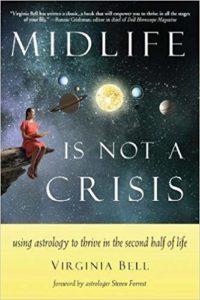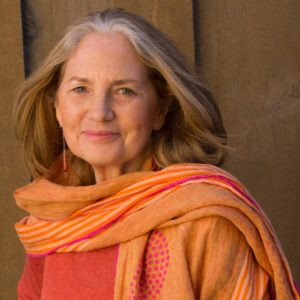Midlife is Not a Crisis…Using Astrology To Thrive In The Second Half of Life by Virginia Bell (Book Excerpt)
 THE SECOND SATURN RETURN
THE SECOND SATURN RETURN
The New Elder (Age 58)
Wisdom is one of the few things in life that does not diminish with age. -Ram Dass
At fifty-eight, there’s another shift as we enter the phase of the elder. Once again, taskmaster Saturn is our guide when we come to our Second Saturn Return. And you thought you were finished with Saturn. Sorry, it returns every twenty-nine years.
Before you mutter Dorothy Parker’s famous “What fresh hell is this?” let me explain. Yes, it’s the same old “tough love” Saturn we met at twenty-nine, so it involves discipline, responsibility, commitment, reality, and new challenges. With our first Saturn cycle as a reference point, we’ve outgrown ourselves again; we need a new purpose, a great work – one that will occupy the rest of our lives. But at this age, our goals are different, and so are we. During our first Saturn cycle at age twenty-nine, we’re invited to move from youth to adulthood; at age fifty-eight, during our second Saturn cycle, we move from adulthood to becoming an elder. During our first cycle, it’s normal to be self-centered; we’re establishing an identity and carving out a place for ourselves in the world. At that age, the ego runs the show, and we tend to be driven, competitive, single minded; we’re focused on what we want to get.
In the second cycle, the ego is no longer in charge; it’s more about what we want to give. What kind of legacy do we want t leave? What do we have to offer the community? What kind of elder we want to become? In our late fifties, the need to “make our mark” or “take the world by storm” recedes and is replaced by a growing desire for wisdom, self-knowledge, and transcendence. This doesn’t mean we can’t continue to be active, alive, ambitious, and successful, but ideally, at this point in our lives, we’re motivated more from a desire for meaning rather than simply for achievement and recognition.
What Is the Great Purpose for This Phase of Our Life?
There is a power rising in you and an invitation to give your gift to the world. – Steven Forrest
Comedian Billy Crystal is a wonderful example of the Second Saturn Return. His career took off at his first Saturn Return when he appeared as Jodie Dallas on Soap, followed by Saturday Night Live and a string of major films.
During his Second Saturn Return, he wrote and starred in a successful one-man show on Broadway. He named it 700 Sundays, the amount of time he had shared with his father, who had died when Billy was fifteen. This touching tribute is filled with Billy’s trademark humor, but it’s also deeply moving and bares the hallmark of high Saturn, the compassionate elder.
Author Frank McCourt began a brand-new career at his Second Saturn Return. He was fifty-nine and retired from teaching when he met Ellen Frey, the woman who would become his third wise. She encouraged him to finally put down on paper the stories he’d been telling to his cronies in bars and taverns; the result was his Pulitzer Prize-winning book, Angela’s Ashes, which he published at sixty-four.
If you’ve read his memoir or seen the movie about his bleak childhood in Ireland, marred by poverty, neglect, and near starvation, you know that it’s a book he could not have written as a young person. The work that comes to us later in life is not that of a young person. Billy Crystal’s one man show or Frank McCourt’s book required more than sheer writing or acting talent; loss, pain, tears, humility, and a lot of hard-earned life experience were necessary ingredients.
For some people, it’s during this third act that they finally receive the recognition they deserve. The artists Cezanne had his first one-man show when he was in his late fifties. At fifty-eight, Al Gore was the subject of an Academy Award-winning documentary, An Inconvenient Truth. At fifty-nine, Gore won the Noble Peace Prize, a Primetime Emmy Award for Current TV, and was named runner up for Time’s Person of the Year.
Hillary Clinton campaigned (for the first time) to be president of the United States during her Second Saturn Return. She was appointed secretary of state shortly after that. Kathryn Bigelow won an Oscar for her film, The Hurt Locker – the first woman to win an Academy Award for directing. In 1982, at his Second Saturn Return, Jimmy Carter started the Carter Center, a non-profit organization devoted to advancing human rights and alleviating human suffering.
We’re not all famous people with high-profile careers, but we all need a way to be in the world as an elder person. Saturn is a no-nonsense planet and wants to manifest something real and finite -as well as something different for everyone. At our first Saturn cycle, we often find a mentor; at the second, we have an opportunity to become one. There’s a desire to pass on what we know, to leave some tangible evidence of our existence, so this may well be the time we begin to teach in our chosen field.
The transition doesn’t have to be professional in nature; for many people, it means being able to spend time with grandchildren, travel the world, become involved in philanthropy or volunteer work, or finally have the time to write the book that’s been calling them. Others reinvent themselves and discover new energy in the process. What’s important is that the projects we pursue and the life we lead reflect who we’ve become and not who we once were.
Both Leslie Stahl (television journalist for 60 Minutes) and author Anne Lamott (Travelling Mercies, Bird by Bird) wrote books about becoming grandmothers. Anne Lamott wrote Some Assembly Required with her son Sam Lamott. It was published when she was fifty-eight (at her Saturn Return).
Leslie Stahl was seventy when her first grandchild was born. Her book, Becoming Grandma: The Joys and Science of the New Grandparenting, came out in 2016. “This is what I didn’t expect. I was at a time in my life when I assumed I had already had my best day, my tallest high. But now I was overwhelmed with euphoria,” she wrote.
Andy Rooney worked for CBS for twenty-nine years (a full Saturn cycle), but it was in 1978(when he was fifty-eight) that he began dispensing wisdom on the segment “A Few Minutes with Andy Rooney” that appeared each week at the end of 60 Minutes. He continued to do it until October 2011, a month before his death at the age ninety-two. Andy Rooney accomplished many things in his life (journalist, author of My War, writer and producer of award-winning television documentaries), yet he is most remembered for his brief weekly segments.
 Virginia Bell started in show business (in the 1960’s), first as an actress, then as a story-editor and screenwriter. From 1974 to 1994, she owned and operated one of the first natural foods restaurants in NYC, Whole Wheat ‘N Wild Berrys.
Virginia Bell started in show business (in the 1960’s), first as an actress, then as a story-editor and screenwriter. From 1974 to 1994, she owned and operated one of the first natural foods restaurants in NYC, Whole Wheat ‘N Wild Berrys.
She has been a full-time astrologer and writer since the late 1990’s, writing columns for Refinery 29, TV Guide, US Weekly, the Huffington Post and Die Welt. She currently writes a horoscope column and celebrity profiles for Watch! (the CBS magazine). She is the author of Midlife Is Not A Crisis: Using Astrology To Thrive In The Second Half Of Life. Virginia is based in New York City. Visit virginiabellastrology.com.
Tags: astrologer, astrology, midlife, spirituality, virginia bell















